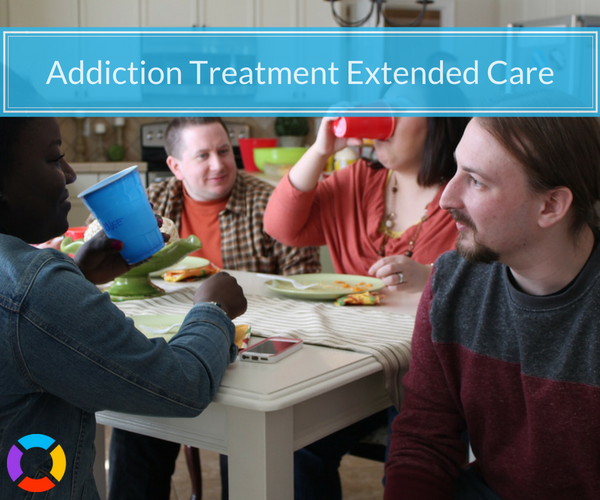Understanding Addiction Aftercare Programs: Why Extended Care Matters

Recovery from addiction is an ongoing process. It doesn’t end when you complete a treatment program. Extended care, like aftercare or ongoing recovery assistance, is essential for sustaining abstinence following rehab.
Addiction aftercare programs provide tools and support for maintaining abstinence during the transition from initial treatment to a long-term sober lifestyle.
Aftercare & Extended Care in Addiction Recovery
Addiction aftercare describes a step-down period where less intensive treatment replaces the highly intensive rehab treatment phase of addiction recovery. Aftercare supports recovery continuity.
This continuing care phase of recovery helps sustain rehab abstinence and provides individualized interventions and resources to address triggers, cravings, and stresses that recovering individuals face as they return to their everyday lives.
Don’t risk a relapse. Call today, and get the support you need!
Aftercare is an important component of effective treatment, especially for those who’ve experienced severe addiction. It increases the likelihood of sustained recovery and long-term success.
Addiction aftercare may include one or more of the following as part of a continuing care continuum:
- Outpatient (intensive outpatient, regular outpatient) programs
- Counseling (individual and group)
- Alumni programs
- 12-step programs
- Holistic treatments (ex: meditation, yoga)
- Sober living homes
Why is Aftercare Important in Substance Abuse Recovery?
Researchers have suggested that 40-60% of people who have addictions will experience relapse.
One study by the Journal of Substance Abuse Treatment found that successful recovery outcomes were more likely when individuals who started their rehab treatment using a detox program or transitioned from detox to a continuing aftercare program.
So, substance abuse aftercare is an important factor in securing long-term recovery success.
Aftercare discourages relapse. It provides structure as you graduate from your initial rehab program. It’s an exciting time to be freshly sober, but many recovering individuals are vulnerable to relapse.
What Happens After Rehab?
Addiction is a chronic disease that often lasts for years and has the potential for relapse. Like other chronic diseases, such as diabetes, addiction requires long-term management.
The post-rehab recovery phase requires continuing care. A continuum of care that begins with rehab and is followed by an aftercare plan gives the recovering person the best chance to obtain a long-term drug-free lifestyle.
Different treatment teams will often work in coordination to provide the medical, psychological, and social support that recovering individuals require.
Types of support may include:
- Transition planning
- Housing support
- Medication management
- Counseling and therapy
- Social services like employment assistance, training
Types of Aftercare Programs for Substance Abuse
Addictions come in many forms. These disorders vary according to the kind of substance used, for how long, and the level consumed at any given time.
Each set of circumstances requires different types of aftercare, and recovery programs vary by intensity and structure to meet these needs. Flexibility increases engagement, which improves outcomes.
Let’s take a look at some common forms of care.
Outpatient Aftercare Treatment
Outpatient treatment may be used as addiction treatment aftercare following inpatient treatment or other addiction rehab program.
Outpatient treatment generally includes the following options:
- Partial Hospitalization Programs (PHP) provide high intensity treatment with no overnight stays. PHPs often include 5 or more days of treatment per week, totaling 20+ hours a week. PHPs often last for 8-12 weeks.
- Intensive Outpatient Programs (IOP) offer between 9-20 hours of treatment per week, over 3-5 days. Programs may last 2 months to 1 year.
- Standard Outpatient Treatmenttakes place in facilities such as community mental health centers, clinics, and rehab facilities. A typical program provides 2-4 hours of treatment per day, for 3-4 days a week, and runs about 10 weeks.
Support Groups and Peer Support Programs
Aftercare therapy can be obtained through support groups and peer networks, 12-step groups, such as Alcoholics Anonymous (AA) or Narcotics Anonymous (NA).
They offer recovering individuals opportunities to meet with peers who share similar circumstances. AA views addiction as a disease that can be managed with the aid of a higher power or spiritual connection.
Other 12-Step groups are based on the AA model of peer support and mutual accountability. Many also embrace a spiritual component.
Other mutual support, peer-based programs include SMART Recovery (Self-Management and Recovery Training) and LifeRing. SMART Recovery is based on cognitive behavioral therapy.
It views addiction not as a disease, but as a dysfunctional habit. Practitioners teach self-management skills augmented by mutual peer support. The SMART Recovery philosophy is secular and doesn’t include a spiritual component.
LifeRing is also a secular organization that uses a peer-to-peer format. It focuses on abstinence and self-empowered addiction recovery assisted by mutual peer support.
Both 12-step and secular peer support groups provide readily available and free support services. Meetings are held in person and online.
Clients are often introduced to self-help peer recovery programs while in rehab treatment. According to a study published in Social Work and Public Health, about 2/3 of people who attend 12-step meetings also previously attended substance abuse rehab.
Clients who started attending 12-step programs while in rehab and continued after treatment achieved better recovery outcomes.
Individual Counseling and Booster Sessions
Following rehab, recovering individuals may attend additional individual counseling sessions as opportunities to periodically assess and reinforce their coping skills and relapse prevention strategies.
They can also discuss any new challenges with professional clinicians. Such “booster sessions” allow the counselor to review the client’s status and adjust treatment if needed.
Sober Living Homes
Sober living homes provide a cost-effective and drug-free living environment. As part of an aftercare plan for substance abuse, sober living homes offer community living with social support to help the recovering individual regain confidence in their ability to live independently.
Sober living homes often link residents with community-based resources such as transportation, medical services, counseling resources, and long-term housing assistance. Many sober homes offer onsite 12-step peer support meetings.
Different types of sober living homes, or recovery homes, are categorized and compared by the National Alliance for Recovery Residencies (NARR) and published by the Substance Abuse and Mental Health Administration (SAMHSA), can be found in the publication Best Practices for Recovery Housing.
Residents of sober homes pay rent and can usually remain in the residence for as long as they need if they follow house rules and remain abstinent. A typical residency lasts at least 3 months, but some residents stay for a year or longer.
Holistic Recovery Services and Aftercare Activities
Holistic recovery services that emphasize mind-body connections and a whole-person healing approach can enhance emotional and physical recovery. Holistic recovery services used in addiction aftercare may include options like:
- Mindfulness and meditation training
- Yoga
- Tai chi
- Acupuncture
- Massage
- Art or music therapy
Find local holistic programs by contacting us today.
Holistic therapies are often available through community-based classes or programs at wellness centers, spas, or holistic practitioners’ offices.
Some treatment centers also offer holistic services as part of their treatment programs. Holistic therapy services can be an important part of a recovering person’s post-rehab integration into a healthier, more balanced lifestyle.
How to Create an Aftercare Plan for Substance Abuse
A substance abuse aftercare plan aligns with recovery goals.
Aftercare planning is essential for achieving lasting abstinence, a healthy and balanced lifestyle, greater self-confidence and improvements in personal and career relationships. A structured plan helps you anticipate challenges by boosting your recovery confidence and providing a roadmap to success.
Your aftercare plan should contain specific details about how you’ll address your personal triggers, temptations, and vulnerabilities.
Some components to include in your aftercare plan for substance abuse are:
- Family members, friends who’ll provide a personal support network
- 12-step or other peer-to-peer support groups you’ll attend
- Alumni meetings to join
- Relapse prevention strategies for addressing high-risk situations
- Healthy lifestyle choices you’ll initiate, such as meditation, adequate sleep, exercise
- Additional support services like vocational training, education, or transitional housing
- Sober home options, if needed
- Counseling support aftercare services–identify best option and schedule appointment(s)
It’s a good idea to work with your counselor or therapist at the end of your initial rehab program and at the beginning of your aftercare phase. Coordinate with them about your ongoing counseling options and any additional community services you’ll need.
Paying for Addiction Aftercare
The cost of aftercare is often a concern for recovering individuals. High costs may lead to a drop in aftercare program attendance and needed care. But there are options that can reduce cost concerns.
Here are some major avenues to pursue:
- Most private health insurance providers are required to provide coverage for mental health care and treatment. Consult your insurance providers about outpatient coverage.
- Medicare and Medicaid pay for some mental health and substance abuse treatment, including outpatient care.
- Explore options from the federal government health insurance program.
- SAMHSA’s FindTreatment.gov lists mental health and addiction treatment centers, including state-funded agencies that usually have lower costs.
- Community mental health centers often offer sliding scale fee rates based on income and ability to pay.
- Grants and scholarships are sometimes available from nonprofits thatsupport underserved or disadvantaged communities and minority groups.
- Sober living homes generally have low-cost rent and offer grants.
Finding the Right Aftercare Program
Finding the right fit for addiction aftercare is important because a strong aftercare program increases adherence to the program and reduces relapse.
Program choice affects long term recovery outcomes. You should match the type of aftercare program (e.g. outpatient counseling, in-person or online therapy, alumni program, 12-step groups, sober home) to your needs.
Consider these factors:
- Intensity of therapy
- Duration of aftercare services
- Location and convenience
- Social supports available
- Lifestyle needs (job, family considerations)
To get help in finding the right program for you, call today.
The Role of Family and Friends in Aftercare
Family support after rehab is vital. Family involvement strengthens recovery outcomes.
Your loved ones help you maintain accountability and motivation to remain abstinent and achieve your goals. Families can support a recovering loved one by celebrating recovery milestones with them, like their acquisition of a 12-step sober coin or the securing of a sought-after job.
Family support works best when it’s encouraging and helpful without being enabling. Addiction 12-step support groups like Al-Anon and Nar-Anon help families learn how to show their concern and offer loving support without enabling. They support family members and help them encourage you.
Relapse Prevention Strategies in Aftercare
Relapse prevention is the most important aspect of aftercare. High risk periods, such as the first 90 days following initial rehab, require structured responses that address temptations. That’s why you need a detailed recovery plan in place following rehab. Having a written plan reinforces what you need to do in vulnerable situations, thus short-circuiting temptation.
A solid aftercare plan with specific, tailored strategies results in good choices that lead to increased resilience. Ongoing therapy and peer accountability also help you keep on track.
FAQ: Common Questions About Aftercare
Examples of aftercare programs include outpatient care and sober living homes.
Time spent in aftercare varies. It can range from days to years. It all depends on individual needs.
Researchers have recommended that patients should attend aftercare following initial rehab, especially if your addiction was severe.
Yes. AA is a great resource, as well as ongoing counseling at an alcohol rehab center. Both focus on relapse prevention.
Outpatient aftercare is a general term encompassing several kinds of ongoing treatment, including outpatient counseling with a trained clinician, support groups, and sober homes. Sober living homes provide peer-oriented, drug-free housing that most often does not include onsite clinical counseling.
Graduating from a rehab program is a great first start, but it’s often not the end of a recovery journey.
Maintaining abstinence isn’t easy, and temptation can often be overwhelming. An aftercare program works to extend your treatment to avoid relapses. These programs aren’t free, but they’re investments into a healthier and happier future.


